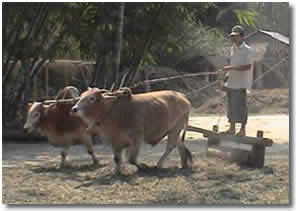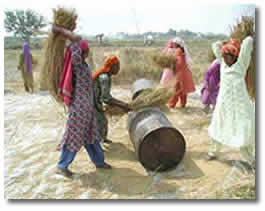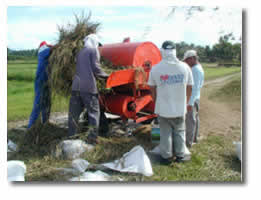|
|
|
Post production: Harvesting |
|
|
|
|
|
|
|
|
|
Threshing |
|
|
|
|
|
|
|
|
|
To describe threshing |
|
|
|
|
|
|
Separating the grains from the straw |
|
What is threshing?
Threshing is the part of the harvesting process where the grains are separated from the straw either by impact, friction or combing action.
Threshing is usually done in the field, near the field or at the nearest road. |
|
|
|
|
|
|
|
|
|
|
|
Thresh properly and on time to prevent losses |
|
Why is proper and timely threshing important?
Any delay between cutting and threshing causes rapid deterioration of the grains, especially during field drying or when the crop is stacked in the field. Poor threshing can also cause high threshing and scattering losses.
|
|
Manual threshing either by hand or with the help of animals |
|
What are the different threshing methods:
1. Foot threshing or trampling: Use of bare feet or animals to thresh the crop which is spread on the floor. In some regions animals have been replaced by tractors.
2. Beating against a threshing rack: The grains are separated from the straw by impact when the crop is beaten against a slatted bamboo, wooden platform or any other hard object such as a steel oil drum.
3. Pedal thresher: Holding the crop against a threshing drum driven by a foot crank combs the grains from the straw. Because small straw chaff and foreign matter drops with the grains, cleaning is needed.
|
|
Mechanical threshing |
|
4. Machine threshing Because of the high labor requirement of manual threshing, mechanical threshers of different types and sizes are increasingly being used.
Depending on the farming system, post-production practices and the available infrastructure, threshers come in different sizes. They range from small portable units without a cleaner such as those used in the Philippines, to large truck-mounted units such as in Thailand. |
|
|
|
|
|
|
Next lesson |
|
In this lesson you learned different ways to separate the grain from the straw, in the following lesson you will learn how to clean the grain. |
|

![obj[1]](obj_1_.gif)



